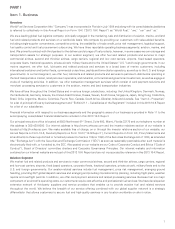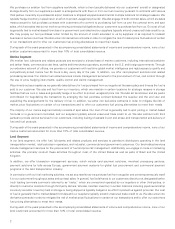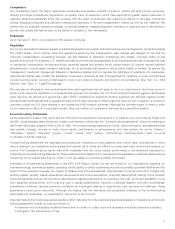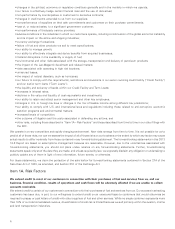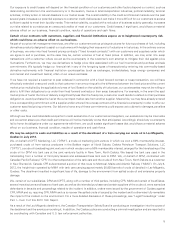World Fuel Services 2013 Annual Report Download - page 16
Download and view the complete annual report
Please find page 16 of the 2013 World Fuel Services annual report below. You can navigate through the pages in the report by either clicking on the pages listed below, or by using the keyword search tool below to find specific information within the annual report.We also maintain fuel inventories for competitive reasons. Because fuel is a commodity, we have no control over the changing market
value of our inventory. Our inventory is valued using the average cost methodology and is stated at the lower of average cost or market.
While we attempt to mitigate these fluctuations through hedging, there can be no assurance that such hedges will be effective. A rapid
decline in fuel prices could cause our inventory value to be higher than market, resulting in our inventory being marked down to market or
the inventory itself sold at lower prices. Accordingly, if the market value of our inventory is less than our average cost, we would record a
write-down of inventory and a non-cash charge to cost of revenue, which would adversely impact our earnings.
Economic, political and other risks associated with international sales and operations could adversely affect our
business and future operating results.
Because we offer fuel products and services on a worldwide basis, our business is subject to risks associated with doing business
internationally. Our business and future operating results could be harmed by a variety of factors, including:
• trade protection measures and import or export licensing requirements, which could increase our costs of or prevent us from
doing certain business internationally;
• the costs of hiring and retaining senior management for overseas operations;
• difficulty in staffing and managing widespread operations, which could reduce our productivity;
• unexpected changes in regulatory requirements, which may be costly and require significant time to implement;
• laws restricting us from repatriating profits earned from our activities within foreign countries, including the payment of
distributions;
• governmental actions that may result in the deprivation of our contractual rights or the inability to obtain or retain authorizations
required to conduct our business;
• political risks specific to foreign jurisdictions; and
• terrorism, war, civil unrest and natural disasters.
In particular, we operate in certain international markets which have been plagued by corruption and have uncertain regulatory
environments, either of which could have a negative impact on our operations there. Furthermore, many countries in which we
operate have historically been, and may continue to be, susceptible to recessions or currency devaluation.
We also operate in certain high risk locations that have been experiencing military action or continued unrest which could disrupt the
supply of fuel or otherwise disrupt our operations in those areas. In these high risk locations, we may also incur substantial operating
costs, including maintaining the safety of our personnel. Furthermore, we cannot guarantee the safety of our personnel in these
locations and there is a risk of serious injury or loss of life of employees or subcontractors.
Our international operations require us to comply with applicable U.S and international laws and regulations.
Doing business on a worldwide basis requires us to comply with the laws and regulations of the U.S. government and various
international jurisdictions. These regulations place restrictions on our operations, trade practices and partners and investment
decisions. In particular, our international operations are subject to U.S. and foreign anti-corruption laws and regulations, such as the
Foreign Corrupt Practices Act (‘‘FCPA’’) and the U.K. Anti-Bribery Act, and economic sanction programs administered by the U.S.
Treasury Department’s Office of Foreign Assets Control (‘‘OFAC’’). The FCPA prohibits us from providing anything of value to foreign
officials for the purposes of influencing official decisions or obtaining or retaining business and the U.K. Anti-Bribery Act prohibits
bribery both in the United Kingdom and internationally, as well as bribery across public and private sectors. As part of our business, we
regularly deal with state-owned business enterprises, the employees of which are considered foreign officials for purposes of the
FCPA. In addition, some of the international locations in which we operate lack a developed legal system and have higher than normal
levels of corruption. Economic sanctions programs restrict our business dealings with certain countries and individuals. From time to
time, certain of our subsidiaries have limited business dealings in countries subject to comprehensive OFAC-administered sanctions,
specifically Cuba, Iran, Syria and Sudan. These business dealings, which represent an insignificant amount of our consolidated
revenues and income, generally consist of the purchase of overflight permits and the provision of flight support and fuel services
pursuant to licenses issued by OFAC or as otherwise permitted by U.S. sanctions regulations. As a result of the above activities, we
are exposed to a heightened risk of violating anti-corruption laws and OFAC regulations. Violations of these regulations are punishable
by civil penalties, including fines, denial of export privileges, injunctions, asset seizures, debarment from government contracts and
revocations or restrictions of licenses, as well as criminal fines and imprisonment.
We have established policies and procedures designed to assist with our compliance with applicable U.S. and international laws and
regulations. However, there can be no assurance that our policies and procedures will effectively prevent us from violating these
regulations in every transaction in which we may engage, and such a violation could adversely affect our reputation, business, financial
condition, results of operations and cash flows. In addition, various state and municipal governments, universities and other investors
maintain prohibitions or restrictions on investments in companies that do business with sanctioned countries, which could adversely
affect the market for our securities.
10



